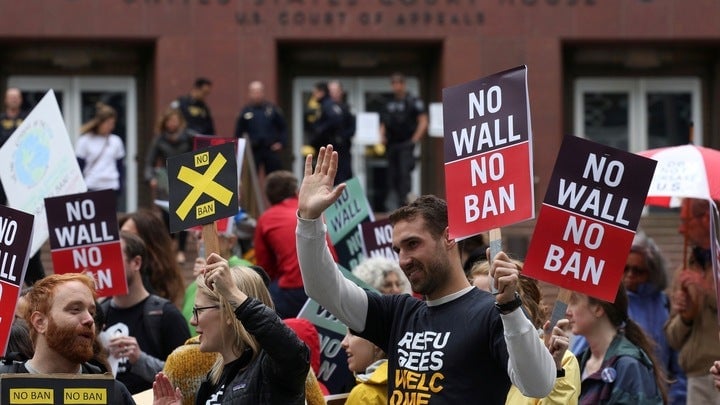A ceremony at the Supreme Court tomorrow could be awkward for Trump
The justices of the US Supreme Court are accustomed to being cordial in the face of conflict. Still, junior justice Neil Gorsuch’s investiture ceremony tomorrow (June 15) could be awkward.


The justices of the US Supreme Court are accustomed to being cordial in the face of conflict. Still, junior justice Neil Gorsuch’s investiture ceremony tomorrow (June 15) could be awkward.
On the afternoon of June 15, president Donald Trump will go to the Supreme Court Building to attend the event for Gorsuch, who he appointed to the bench in April. It’s his first visit there as president. The ceremony also happens to take place during the last hour before the deadline for the Department of Justice to file briefs to support the president’s request that the Supreme Court review the legality of his March 6 executive order halting travel to the US for citizens of six predominantly Muslim nations.
Specifically, Trump is seeking review of recent Ninth and Fourth Circuit court opinions upholding injunctions on the enforcement of the travel ban arising out of district courts in Hawaii and Maryland, respectively. Yet the president has been busily undermining the DOJ’s arguments in this case with his public proclamations.
Since the DOJ initially petitioned for Supreme Court review on June 1, Trump has tweeted about the order, the courts, and his disdain for political correctness, confirming the claims of travel-ban challengers that the executive order is religiously motivated and violates constitutional guarantees to freedom of religion.
Now, the DOJ is about to file the two last briefs in support of its case, and attorneys at the justice department are surely hoping Trump won’t talk or tweet about it, or taunt the high court before they file.
On May 25, the Fourth Circuit upheld a Maryland district court’s temporary freeze on the travel ban on the grounds that it appears to violate the constitutional guarantee to freedom of religion. The Fourth Circuit court based the decision on Trump’s public record of statements indicating his order was motivated by anti-Muslim sentiment rather than national security concerns.
In response, the DOJ on June 1 filed a petition for review of that Fourth Circuit decision in the Supreme Court, and—although no opinion had yet been issued—on a pending appeal in the Ninth Circuit in Donald Trump et al v. State of Hawaii. The petition also asked the Supreme Court justices to determine the legality of the executive order.
Then, on June 12, the Ninth Circuit issued a decision on the Hawaii case. The court’s opinion stated that it did not need to rule on whether the travel ban violates the constitutional guarantee of religious freedom, because the executive order also exceeds the power Congress has given to the president to regulate immigration. The Ninth Circuit decision also notes that courts should avoid making decisions on constitutional grounds when there’s an alternative basis for a ruling.
Because the Ninth Circuit based its opinion on different reasoning than the Fourth Circuit, the DOJ asked the Supreme Court for a last-minute opportunity to respond to this new information. On June 13, late in the afternoon, the Supreme Court granted the DOJ’s request (pdf), ordering the government to submit any final arguments by June 15. Response briefs by opponents of the travel are due on June 20. The DOJ also will get one day after that to file a reply to those response briefs .
Hawaii’s counsel, Neil Katyal, in a letter to the high court (pdf), opposed the DOJ’s request to respond and reply—that is, submit two more filings—but agreed that the parties should address the Ninth Circuit opinion.
Given the high court’s looming summer recess—the spring term ends on June 26—the schedule is tight for everyone and tensions may run high this month even for the usually cool justices.
As for Gorsuch’s investiture ceremony, there will probably be no explicit talk of Trump’s travel ban but the controversial executive order will surely loom large nonetheless.